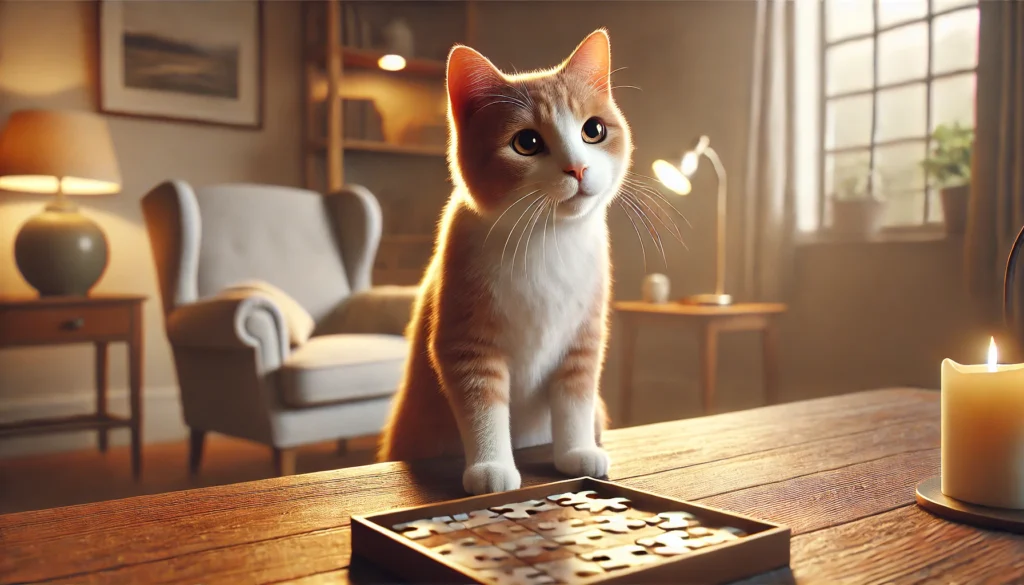how smart are cats?

Cats have long been regarded as mysterious, independent creatures, often labeled as aloof or uninterested in forming deep bonds with their human companions. However, when we ask how smart are cats, we quickly realize that their intelligence is multi-faceted, with characteristics that demonstrate cognitive complexity, emotional intelligence, and an ability to solve problems. Whether it’s their ability to manipulate their environment, communicate with humans, or learn new behaviors, cats are far more intelligent than many people assume.
In this article, we’ll explore all the different ways that cats exhibit intelligence, compare their smarts to those of dogs, and even explore how we can test their IQ. By the end, you’ll have a deeper understanding of how smart are cats and why they might be more intelligent than you think.
1. How Smart Are Cats? Defining Intelligence in Animals
Before we delve deeper into answering how smart are cats, it’s essential to define what intelligence means in animals. Intelligence is not a single attribute but rather a combination of different cognitive abilities. These include:
- Problem-solving skills: The ability to navigate obstacles and find solutions.
- Social intelligence: Understanding and responding to social relationships.
- Memory: Retaining and recalling learned information.
- Communication: Expressing needs, emotions, and ideas effectively.
- Self-awareness: Recognizing oneself as an individual entity.

When we apply these definitions to cats, we see that they demonstrate remarkable cognitive flexibility, often in ways that are distinct from other animals like dogs. So, how smart are cats? Let’s explore some key indicators of feline intelligence.
2. How Smart Are Cats? Problem-Solving Abilities in Felines
When we think about how smart are cats, one of the first aspects that come to mind is their problem-solving ability. While cats are not as overtly trainable as dogs, they have the capacity to solve complex problems, often in a more independent manner.
A. Tool Use and Environmental Manipulation: How Smart Are Cats in Their Environment?
While not known for using tools in the same way that some primates do, cats can be highly resourceful when it comes to manipulating their environment. Cats can open doors, cabinets, and even pull open containers that contain food. For instance, a cat that associates the sound of a cupboard door with food will figure out how to open it. This skill to manipulate their environment indicates that cats understand cause-and-effect relationships, an essential aspect of intelligence.
B. Puzzle Solving: How Smart Are Cats When It Comes to Food Challenges?
One clear example of how smart are cats is their ability to solve puzzles. A cat IQ test or puzzle might involve a treat hidden in a toy or a contraption that requires manipulation to open. Cats often use trial and error, creative thinking, and memory to unlock the puzzle. Cats are highly persistent and show great patience when solving challenges, demonstrating intelligence that rivals many species. So, how smart are cats in comparison to other pets like dogs? In terms of problem-solving, they may surprise you!
C. Hunting and Stalking: How Smart Are Cats in the Wild?
When it comes to hunting, cats demonstrate cognitive skills that are critical to their survival in the wild. Their ability to stalk prey, assess the situation, and calculate the best strategy to catch it requires a high level of intelligence. Even domesticated cats exhibit these behaviors when hunting toys or even food, showcasing advanced problem-solving and situational awareness.
3. How Smart Are Cats? Social Intelligence and Emotional Awareness
While cats are often seen as solitary creatures, they are actually quite social and emotionally intelligent animals. Understanding how smart are cats also involves recognizing their ability to form attachments and understand social cues, not just solve puzzles.
A. Attachment to Humans: Do Cats Form Emotional Bonds?
Many people wonder, are cats smart animals because they don’t seem as outwardly affectionate as dogs. However, research has shown that cats form strong emotional bonds with their human companions. A 2019 study found that cats showed attachment behaviors toward their owners, akin to how children attach to their caregivers. When separated from their owners, cats displayed signs of distress, and upon reunion, they would often seek comfort from their humans. This attachment indicates emotional intelligence and the capacity for relationships. So, the next time you wonder how smart are cats, remember that their emotional intelligence is as complex as their problem-solving skills.
B. Communication: How Do Cats Talk to Us?
A major aspect of how smart are cats is their communication skills. Cats express their feelings and needs through vocalizations, body language, and even facial expressions. Cats use meowing primarily to communicate with humans, unlike dogs, which use barking to communicate with both humans and other animals.
- Meowing: Cats use various meows to express hunger, desire for attention, or even to greet their owners.
- Purring: Often a sign of contentment, purring can also serve as a self-soothing behavior when cats are stressed or unwell.
- Body Language: The position of a cat’s tail, ears, and whiskers communicates its mood—whether it’s happy, anxious, or frightened.
By adjusting their vocalizations and actions based on the situation and the person involved, cats demonstrate how smart are cats when it comes to social interaction.
C. Emotional Sensitivity: Can Cats Sense Human Emotions?
One remarkable sign of how smart are cats is their ability to sense and respond to human emotions. Studies have shown that cats can distinguish between happy and angry human faces, adjusting their behavior accordingly. Cats will often seek out affection from their owners when they sense sadness or stress. This empathy and emotional awareness showcase the high emotional intelligence of cats.
4. How Smart Are Cats? Memory and Learning Capabilities
When we ask how smart are cats, it’s crucial to consider their memory and learning abilities. Cats are highly capable of remembering people, places, and experiences, which is an essential aspect of their intelligence.
A. Long-Term Memory: How Smart Are Cats in Remembering Past Experiences?
Cats exhibit long-term memory that allows them to recall past experiences and places. For example, cats can remember where they’ve been fed, where their favorite resting spots are, and even recognize people they haven’t seen in a while. If you’ve ever seen your cat recognize a long-lost friend or come back to a familiar home after a long trip, you’ve witnessed a cat’s exceptional memory at work.
B. Associative Learning: How Smart Are Cats at Making Connections?
Cats are masters of associative learning, which allows them to link specific actions or stimuli to certain outcomes. For instance, a cat might learn that a specific sound (like the can opener) precedes mealtime, or they might associate the sound of keys with their owner’s return home. By understanding these associations, cats can adapt their behavior based on learned cues.
5. How Smart Are Cats Compared to Dogs? Feline vs. Canine Intelligence
The ongoing debate of how smart are cats compared to dogs often centers around their trainability and social behaviors. Dogs are typically more eager to please, making them more trainable and more easily directed by humans. However, this does not necessarily equate to greater intelligence.
A. Cats vs. Dogs: Who’s Smarter?
While dogs are often considered more trainable, cats have an advantage in other areas, particularly in problem-solving and independence. Dogs have been bred to work alongside humans, which may contribute to their strong social intelligence. Cats, on the other hand, evolved as solitary hunters, which has honed their problem-solving abilities, independence, and self-reliance.
When asking how smart are cats, it’s essential to remember that their intelligence is simply expressed in different ways. Cats may not follow commands as eagerly as dogs, but their ability to manipulate their environment, solve puzzles, and navigate complex social dynamics suggests a deep intellectual capacity.
B. Cat Intelligence vs. Dog Intelligence: How Do They Compare?
A common way of comparing how smart are cats and how smart are dogs is through intelligence quotient (IQ) tests. While dogs typically score higher on basic obedience and trainability, cats excel in more abstract forms of intelligence. Studies of cat intelligence show that cats can perform cognitive tasks that require memory, learning, and problem-solving skills. Cat IQ tests can measure their ability to figure out puzzles, navigate obstacles, and even adapt to new environments.
So, when you ask, who is smarter, a cat or a dog?, it depends on the criteria you’re using to measure intelligence. Cats may not be as eager to please, but their independence, resourcefulness, and cognitive flexibility set them apart.
6. The Smartest Cat Breeds: Which Cats Are the Most Intelligent?
If you’ve ever wondered about the smartest cat breed, it’s essential to recognize that intelligence varies among individual cats and breeds. However, there are a few breeds that are widely regarded as highly intelligent. These include:
Tips
Cat hiccups might seem cute, but did you know they could reveal surprising secrets about your pet’s health and quirky habits?
A. Siamese Cats: How Smart Are Siamese Cats?
Known for their vocalizations and playful nature, Siamese cats are often regarded as the most intelligent breed. They are highly interactive, learn quickly, and love solving puzzles.
B. Maine Coons: How Smart Are Maine Coons?
Maine Coons are known not only for their size but also for their trainability and ability to learn commands. These cats are often described as “dog-like” in their behavior due to their problem-solving abilities and strong bonds with their owners.
C. Bengal Cats: How Smart Are Bengals in Solving Problems?
Bengal cats are highly energetic and curious, often exhibiting behaviors that show a high degree of intelligence. They are known for their problem-solving abilities and ability to engage with complex toys.
D. Abyssinian Cats: How Smart Are Abyssinians?
Abyssinians are known for their energy and curiosity, often involving themselves in activities that require mental stimulation. They are quick learners and excel in tasks that require reasoning.
7. How Smart Are Cats? Measuring Their Intelligence
If you’re wondering, what is a cat’s IQ or how smart are cats, there are various ways to test their intelligence. You can use cat IQ tests, which measure your cat’s ability to solve puzzles, remember tasks, and navigate challenges. However, it’s important to note that there’s no definitive “IQ” test for cats like there is for humans. Nevertheless, observing your cat’s ability to adapt, learn, and problem-solve will give you a good sense of their intelligence.
A. Feline IQ Tests: How Smart Are Cats in Testing Environments?
Feline IQ tests involve placing a cat in situations where it has to solve puzzles or manipulate objects to gain rewards. These can include food puzzles, memory tests, or challenges that require the cat to engage its natural instincts.
B. How Smart Are Cats in Daily Life?
Cats are highly perceptive and often show signs of intelligence in their daily behaviors. If your cat is quick to adapt to new environments, solve problems, or respond to new cues, then you are likely witnessing the depth of their cognitive abilities.
8. Conclusion: How Smart Are Cats?
So, how smart are cats? The evidence suggests that cats are far more intelligent than we might initially assume. Their cognitive abilities, emotional intelligence, memory, and problem-solving skills show that they are not just aloof, independent creatures but highly intelligent beings in their own right.
Whether solving puzzles, forming bonds with humans, or adjusting to new situations, cats exhibit a level of intelligence that rivals some of the smartest animals in the world. The next time you ask, how smart are cats, you can confidently say that they are not just clever—they are downright brilliant.
1. What is the IQ of a cat?
Cats don’t have a specific IQ score like humans. However, cat intelligence can be measured by their problem-solving abilities, memory, and learning capacity. While there is no standardized cat IQ test, studies show that cats can solve puzzles, learn complex behaviors, and adapt to new situations, indicating a high level of intelligence, especially when it comes to independent thinking and environment manipulation.
2. How smart is a cat compared to a human?
In terms of cognitive abilities, cats have a much simpler brain structure compared to humans. A human brain has approximately 86 billion neurons, whereas a cat’s brain has about 300 million. While this means humans generally have more cognitive potential, cats excel in specific skills like problem-solving, memory, and sensory perception. Cats are smarter than dogs in some areas, particularly in independent thinking and adapting to complex situations, but they do not possess the same level of reasoning or abstract thought as humans.
3. Are cats smarter than dogs?
While cats and dogs have different kinds of intelligence, comparing them directly is challenging. Dogs are more trainable and eager to please, making them more responsive to human commands, but cats excel in other areas like problem-solving and independence. Cats are generally better at adapting to new environments and solving problems without external guidance. In terms of pure intelligence, cats are often considered more self-reliant and capable of complex problem-solving than dogs, but dogs tend to outperform cats in tasks requiring teamwork with humans.
4. How complex are a cat’s thoughts?
A cat’s thoughts are generally considered less complex than a human’s, but they are highly adaptive. Cats think in terms of instincts, routines, and learned experiences. Their thoughts are focused on meeting their basic needs (food, safety, territory) and responding to stimuli around them (such as sounds, movements, or environmental changes). While they don’t engage in abstract thought like humans, their cognitive abilities are complex in the sense that they can learn, adapt, and make independent decisions to achieve their goals.
5. Do cats view us as cats?
While cats may not see us as other cats, they do view us as part of their social environment. Research suggests that cats view their owners more like a mother figure or familiar companion than a separate species. They may imitate cat-like behaviors toward their humans, like grooming or kneading, and some cats might even meow exclusively at humans—something they don’t typically do with other cats. However, cats still recognize us as different beings and understand that we are not the same as other cats, despite their behavior suggesting an affectionate bond.
6. How long is a cat’s memory?
Cats have both short-term and long-term memory, and their ability to remember is often linked to experiences that are emotionally charged or meaningful to them. Short-term memory in cats lasts anywhere from 16 hours to 24 hours, similar to other animals. Long-term memory can last much longer, particularly when it comes to learned behaviors, familiar faces, or past traumas. Cats can remember people, places, and specific events, and they may react based on those memories even after several years. This strong associative memory helps them navigate their environment and respond to familiar cues.






